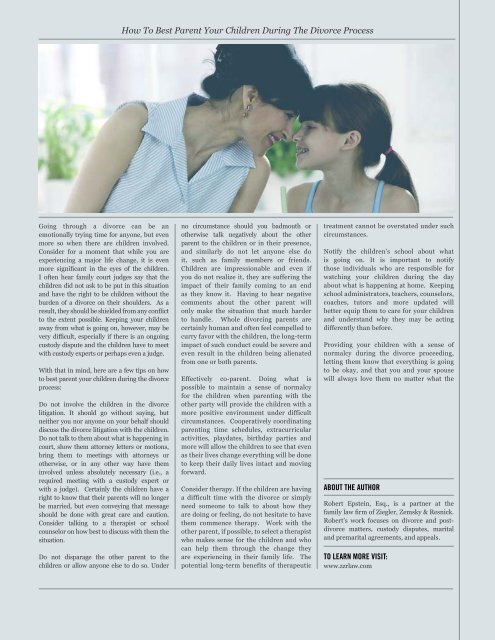24 Seven May 2019
24/seven is a monthly, free magazine for personal growth, professional development, and self-empowerment. The approach is holistic, incorporating mind, body, soul, and spirit. As philosopher Francis Bacon said, “Knowledge is power.” Use this information to live your best life now.
24/seven is a monthly, free magazine for personal growth, professional development, and self-empowerment. The approach is holistic, incorporating mind, body, soul, and spirit. As philosopher Francis Bacon said, “Knowledge is power.” Use this information to live your best life now.
- No tags were found...
You also want an ePaper? Increase the reach of your titles
YUMPU automatically turns print PDFs into web optimized ePapers that Google loves.
How To Best Parent Your Children During The Divorce Process<br />
Going through a divorce can be an<br />
emotionally trying time for anyone, but even<br />
more so when there are children involved.<br />
Consider for a moment that while you are<br />
experiencing a major life change, it is even<br />
more significant in the eyes of the children.<br />
I often hear family court judges say that the<br />
children did not ask to be put in this situation<br />
and have the right to be children without the<br />
burden of a divorce on their shoulders. As a<br />
result, they should be shielded from any conflict<br />
to the extent possible. Keeping your children<br />
away from what is going on, however, may be<br />
very difficult, especially if there is an ongoing<br />
custody dispute and the children have to meet<br />
with custody experts or perhaps even a judge.<br />
With that in mind, here are a few tips on how<br />
to best parent your children during the divorce<br />
process:<br />
Do not involve the children in the divorce<br />
litigation. It should go without saying, but<br />
neither you nor anyone on your behalf should<br />
discuss the divorce litigation with the children.<br />
Do not talk to them about what is happening in<br />
court, show them attorney letters or motions,<br />
bring them to meetings with attorneys or<br />
otherwise, or in any other way have them<br />
involved unless absolutely necessary (i.e., a<br />
required meeting with a custody expert or<br />
with a judge). Certainly the children have a<br />
right to know that their parents will no longer<br />
be married, but even conveying that message<br />
should be done with great care and caution.<br />
Consider talking to a therapist or school<br />
counselor on how best to discuss with them the<br />
situation.<br />
Do not disparage the other parent to the<br />
children or allow anyone else to do so. Under<br />
no circumstance should you badmouth or<br />
otherwise talk negatively about the other<br />
parent to the children or in their presence,<br />
and similarly do not let anyone else do<br />
it, such as family members or friends.<br />
Children are impressionable and even if<br />
you do not realize it, they are suffering the<br />
impact of their family coming to an end<br />
as they know it. Having to hear negative<br />
comments about the other parent will<br />
only make the situation that much harder<br />
to handle. Whole divorcing parents are<br />
certainly human and often feel compelled to<br />
curry favor with the children, the long-term<br />
impact of such conduct could be severe and<br />
even result in the children being alienated<br />
from one or both parents.<br />
Effectively co-parent. Doing what is<br />
possible to maintain a sense of normalcy<br />
for the children when parenting with the<br />
other party will provide the children with a<br />
more positive environment under difficult<br />
circumstances. Cooperatively coordinating<br />
parenting time schedules, extracurricular<br />
activities, playdates, birthday parties and<br />
more will allow the children to see that even<br />
as their lives change everything will be done<br />
to keep their daily lives intact and moving<br />
forward.<br />
Consider therapy. If the children are having<br />
a difficult time with the divorce or simply<br />
need someone to talk to about how they<br />
are doing or feeling, do not hesitate to have<br />
them commence therapy. Work with the<br />
other parent, if possible, to select a therapist<br />
who makes sense for the children and who<br />
can help them through the change they<br />
are experiencing in their family life. The<br />
potential long-term benefits of therapeutic<br />
treatment cannot be overstated under such<br />
circumstances.<br />
Notify the children’s school about what<br />
is going on. It is important to notify<br />
those individuals who are responsible for<br />
watching your children during the day<br />
about what is happening at home. Keeping<br />
school administrators, teachers, counselors,<br />
coaches, tutors and more updated will<br />
better equip them to care for your children<br />
and understand why they may be acting<br />
differently than before.<br />
Providing your children with a sense of<br />
normalcy during the divorce proceeding,<br />
letting them know that everything is going<br />
to be okay, and that you and your spouse<br />
will always love them no matter what the<br />
ABOUT THE AUTHOR<br />
Robert Epstein, Esq., is a partner at the<br />
family law firm of Ziegler, Zemsky & Resnick.<br />
Robert’s work focuses on divorce and postdivorce<br />
matters, custody disputes, marital<br />
and premarital agreements, and appeals.<br />
TO LEARN MORE VISIT:<br />
www.zzrlaw.com


















